Key takeaways:
- Fair trade materials empower farmers and artisans by ensuring they receive fair wages and support for their communities.
- Ethical sourcing fosters sustainable practices and raises social awareness about responsible consumption.
- Supporting fair trade directly contributes to community development and individual stories, enriching consumers’ understanding and appreciation of their purchases.
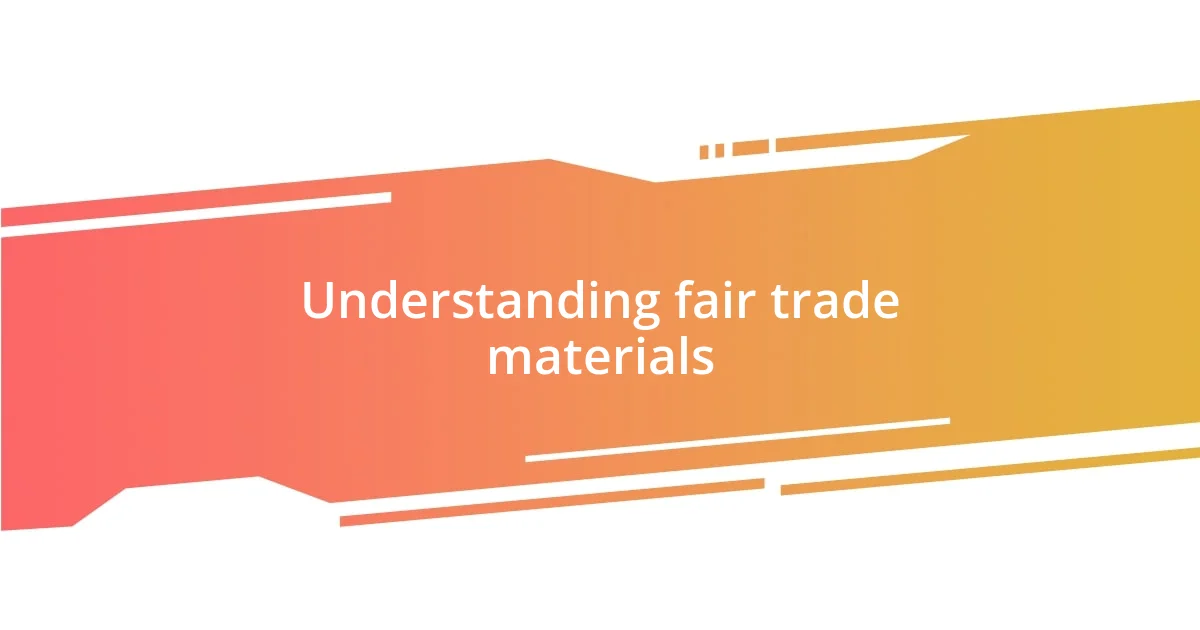
Understanding fair trade materials
Fair trade materials are products sourced from farmers and artisans who are paid fairly for their work, ensuring they receive a living wage that supports their families and communities. I remember my first encounter with fair trade coffee; the rich aroma not only delighted my senses but also made me curious about the journey it took from the farm to my cup. Knowing that my purchase was helping empower farmers made each sip feel even more satisfying.
These materials often include textiles, coffee, chocolate, and even handcrafted goods. What struck me is how fair trade certification guarantees specific practices, like sustainable farming or ethical labor conditions. Have you ever considered what goes into making the clothes you wear? When I learned that many textiles can be produced in ways that are damaging to both people and the planet, I felt a strong urge to seek out fair trade alternatives.
Engaging with fair trade materials goes beyond just consuming responsibly; it’s about making a conscious choice to support ethical practices. I remember taking a moment to reflect on every fair trade product I purchased and imagining the hands that made it. Isn’t it incredible to think that our everyday choices can have such a profound impact on someone else’s life? This connection is at the heart of what fair trade materials represent.
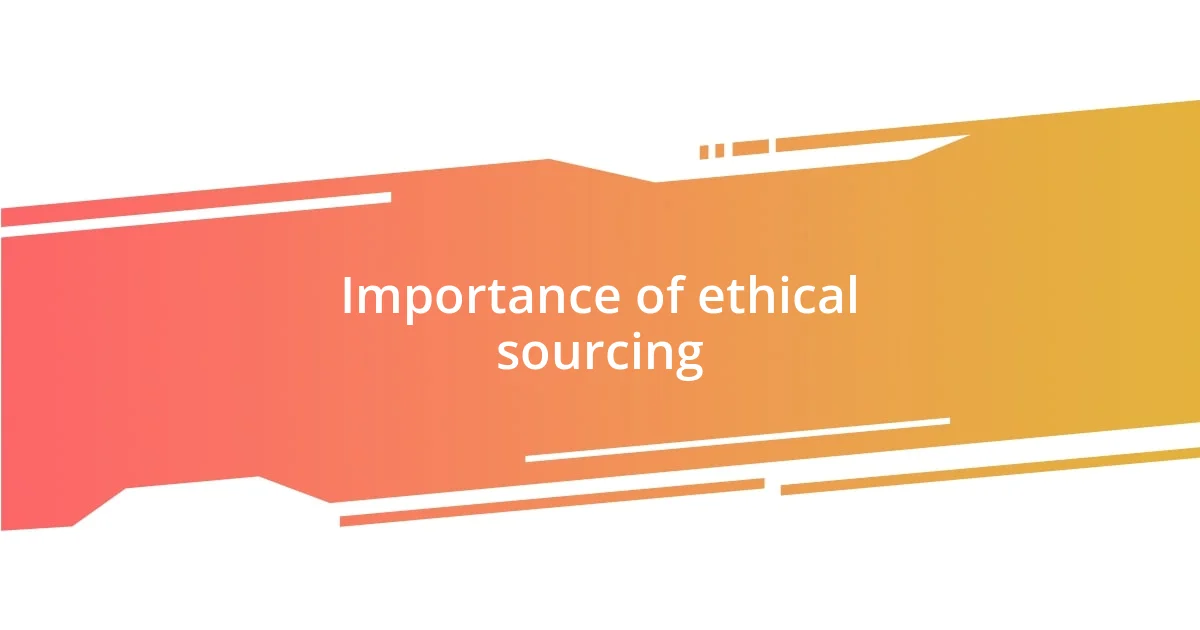
Importance of ethical sourcing
Ethical sourcing is crucial for fostering a fairer global economy. When I first discovered the difference it makes, I was genuinely surprised by how a simple purchase could extend far beyond my checkout impulse. Each conscious decision to buy ethically sourced products empowered artisans and farmers, providing them with opportunities they might not have otherwise. Imagine the pride of a farmer knowing their hard work translates directly into a better life for their family!
- It helps combat poverty by ensuring fair wages for producers.
- It promotes sustainable practices, reducing harm to the environment.
- Engaging in ethical sourcing supports community development and education.
Every time I interact with a product knowing its backstory, I feel a deeper connection—a bond that reminds me of the shared humanity in our consumption choices. It’s like a ripple effect; my choices resonate beyond my immediate needs, inspiring others to consider the stories behind the items they buy.
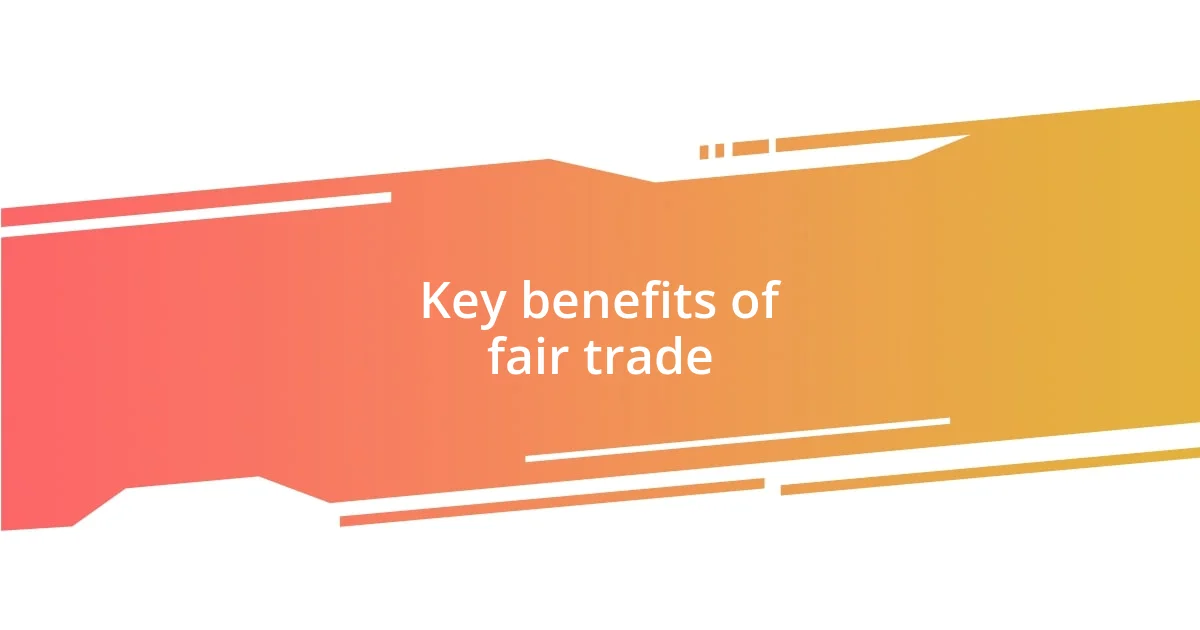
Key benefits of fair trade
When I think about the key benefits of fair trade, the first thing that comes to mind is the empowering impact it has on communities. I vividly recall visiting a local fair trade market where artisans proudly displayed their handcrafted goods. Each item told a story—a story of resilience, skill, and hope. By choosing fair trade products, I’m supporting these talented individuals directly, ensuring they can invest in their families’ futures and uplift their communities. Isn’t it heartening to know that by purchasing a beautifully woven basket, I’m contributing to sustainable livelihoods?
Another critical advantage is the commitment to sustainable practices. I’ve always been drawn to eco-friendly products, but discovering fair trade materials heightened my awareness even further. For instance, I learned that fair trade coffee is cultivated without harmful pesticides, preserving local biodiversity. This not only helps the environment but also benefits the health of farmers and consumers alike. The next time I enjoy my cup of fair trade coffee, I can appreciate the balance it strikes between taste and sustainability.
Lastly, fair trade fosters a sense of community and social awareness among consumers. When I share the stories behind my fair trade purchases with friends, it often sparks rich conversations about ethical consumption. I’ve seen how these discussions lead others to consider where their products come from, creating a collective shift towards responsible buying habits. Isn’t it wonderful that each conscious choice we make can inspire others to think more deeply about their purchasing decisions?
| Benefit | Description |
|---|---|
| Empowerment | Supports producers and their communities through fair wages and opportunities. |
| Sustainability | Encourages eco-friendly practices that protect the environment. |
| Social Awareness | Stimulates conversations about ethical consumption and responsible choices. |
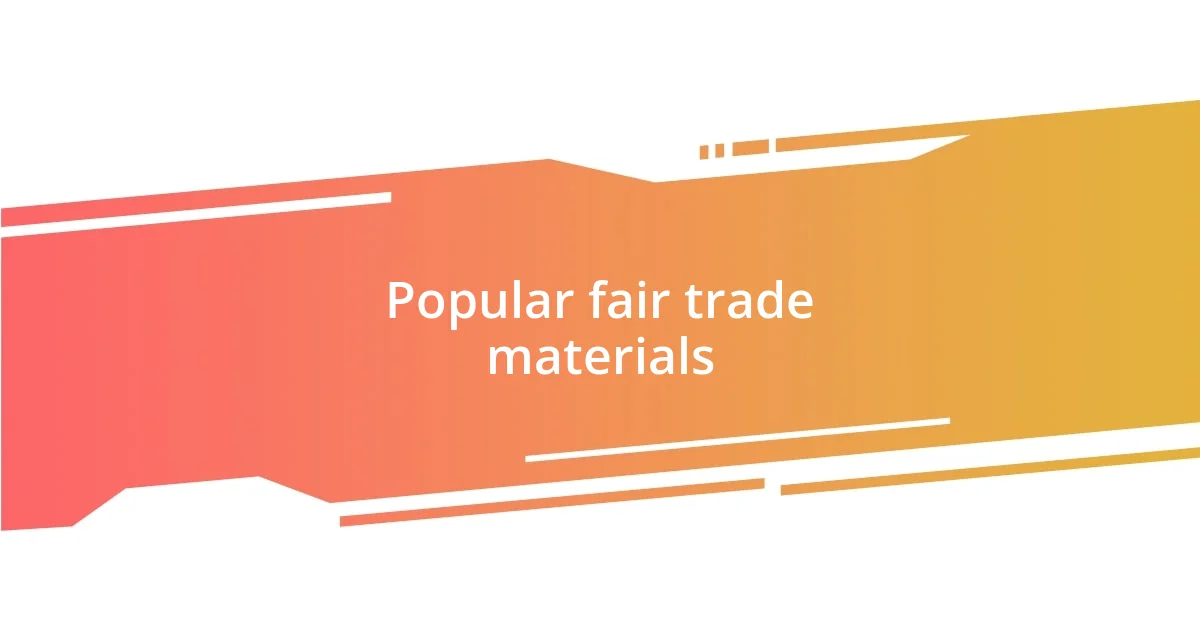
Popular fair trade materials
When I first started exploring fair trade materials, I was particularly captivated by cotton. It was fascinating to learn that fair trade cotton not only guarantees farmers a fair price but also promotes sustainable farming practices. During a trip to a fair trade textile workshop, I had the chance to see artisans craft stunning fabrics, and witnessing their pride truly struck a chord with me. Have you ever considered how the soft cotton shirt you’re wearing might be linked to someone’s hard work and dreams?
Another popular material that caught my eye was cocoa. The quality of fair trade chocolate is simply unparalleled. I remember indulging in some fair trade dark chocolate and feeling a burst of flavors that I often overlooked in conventional brands. The realization that my sweet treat was sourced ethically, supporting farmers in developing countries, made every bite feel meaningful. Isn’t it amazing to think that our delicious moments can also uplift communities in need?
Additionally, I’ve come to appreciate fair trade home goods—like handcrafted pottery and woven baskets. I once hosted a gathering where I featured these items, and the stories behind each piece became conversation starters. People were genuinely intrigued by how the artisans poured their hearts into creating them. It got me thinking: how often do we stop to appreciate the artistry and labor that goes into the items we use daily? Each piece isn’t just decor; it’s a connection to the people and traditions behind it.
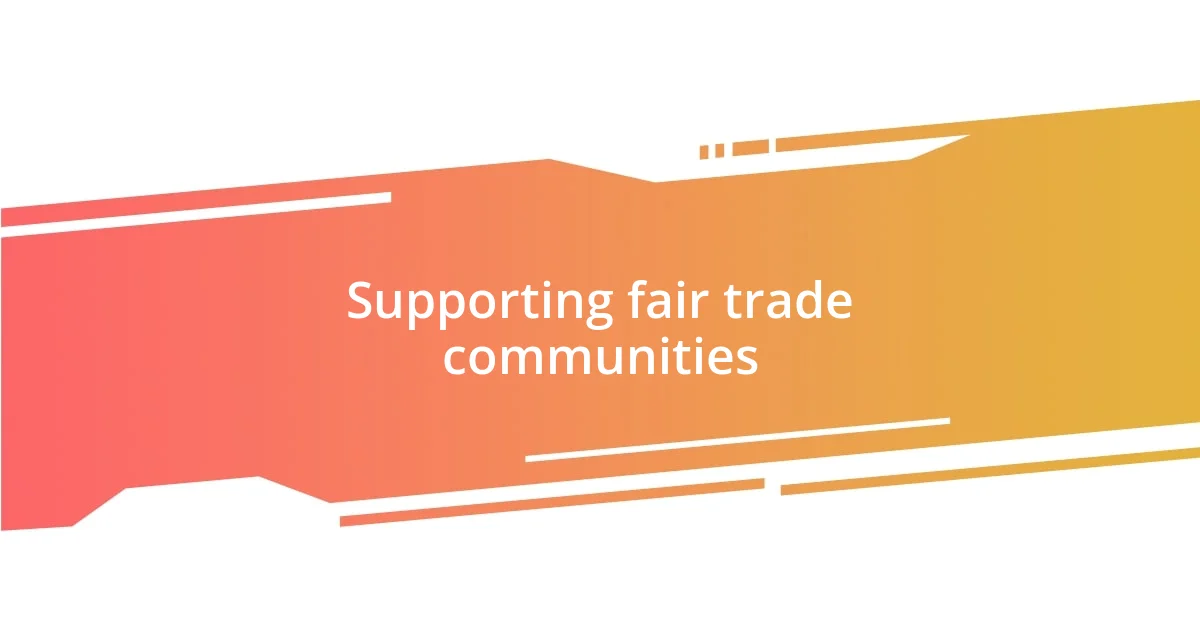
Supporting fair trade communities
Supporting fair trade communities is about establishing meaningful connections that resonate on both personal and collective levels. I remember attending a fair trade festival where local artisans shared their experiences; one artisan spoke passionately about how fair trade cooperatives transformed her community. Hearing her tale made me realize that my purchase could help fund children’s education and healthcare—what a powerful impact from a simple choice! Have you ever thought about how your buying habits could create such ripples in someone’s life?
Moreover, the emotional rewards of supporting fair trade are immense. I distinctly recall the joy I felt when I gifted fair trade products to friends and family. Each time I presented an item, I could share not just the story behind the craft but also the person whose effort and dreams were woven into it. It sparked conversations that went beyond the gift itself, leading others to reflect on their own consumption choices. Isn’t it enriching to know we can create a chain reaction of awareness just by sharing these stories?
As I delve deeper into fair trade communities, I often find myself inspired by the resilience of these producers. Each fair trade basket I own serves as a reminder of the creativity and determination of its maker. I once asked an artisan about her vision for the future, and her ambitions were incredibly motivating—she spoke of a community center for local youth and more opportunities for young artisans. It struck me then, how with each fair trade purchase, I’m not just buying a product; I’m investing in a brighter future for many. Isn’t it beautiful that our support can help dreams flourish?















